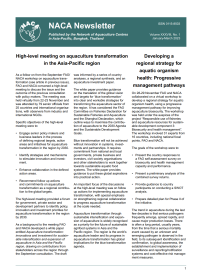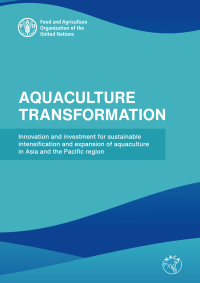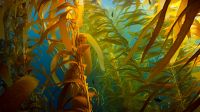In this issue:
High-level meeting on aquaculture transformation in the Asia-Pacific region; Developing a regional strategy for aquatic organism health: Progressive management pathways; Job opportunity - health management and husbandry researcher; 2022 China-ASEAN International Forum on Sustainable Development of Fisheries and Aquaculture Under the Blue Transformation Strategy; A new progressive management pathway for improving seaweed biosecurity; Indian delegates visit Thailand for training and industry exposure; PhD scholarships: Shanghai Ocean University PhD Programme 2023; Reported aquatic animal diseases in the Asia-Pacific region during the second quarter of 2022.
The document provides an overall vision and framework intended to accelerate aquaculture transformation in Asia and the Pacific region through innovations and investment, and to provide guidance to partners from the public, private and development communities to actively engage with the region in transforming aquaculture to more efficient, inclusive, resilient and sustainable food systems. The document served as background information for discussion in the High-Level Meeting on Aquaculture Transformation in Asia and the Pacific Region, 22–23 November 2022, organised by the FAO Regional Office for Asia and the Pacific and the Network of Aquaculture Centres in Asia-Pacific. The document is broadly aligned with FAO’s Blue Transformation Roadmap, paying specific attention to the context and needs of aquaculture within Asia and the Pacific region. The Paper translates the Roadmap into a vision and priority actions for aquaculture transformation in the region by 2030.
A new paper in Nature Communications by Cottier Cook et al. describes the need for a new progressive management pathway to improve seaweed biosecurity. The seaweed aquaculture industry has rapidly expanded to 35 million tonnes per annum, a production that represents 51% of global coastal aquaculture by volume. Rising seawater temperatures and coastal eutrophication have led to an increase in infectious diseases and pest outbreaks. The paper describes a process for developing and implementing locally-adapted progressive management pathways to address seaweed disease and pest issues.
Update: The forum will now be held on 13 December and and updated conference agenda is available below. Please register your attendance using the form linked below. A Zoom link will be sent to all registered participants before the meeting, thank you.
A free online forum will be organised by the Agriculture Trade Promotion Center, Ministry of Agriculture and Rural Affairs of the People’s Republic of China, and Yellow Sea Fisheries Research Institute, Chinese Academy of Fishery Sciences, and NACA. The forum aims to strengthen international exchange and cooperation in aquatic trade, promote high-quality development of fisheries, disseminate advanced concepts, technologies, and models of aquaculture in the Asia-Pacific region and Silk Road countries, and promote the health and sustainable development of global fisheries. Participation is free but registration is required.
The Norwegian Veterinary Institute has a vacant three-year position as a researcher in the expanding area of sustainable aquaculture development internationally, with a desired start-up as soon as possible. This is an exciting opportunity for competent candidates with interest and experience from working internationally with farmed aquatic animal health management and husbandry. The right candidate will be joining our team of experts in epidemiology, biosecurity, diagnostics and applied health management. All nationalities eligible.



